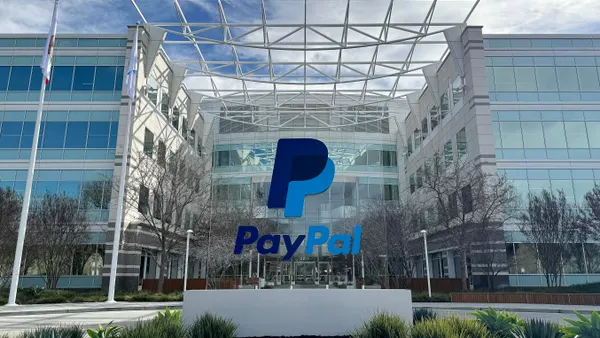Dive Brief:
-
Macy's cannot offer the use of its Scan and Pay app for purchases from departments where employees make commissions, and must pay back commissions on such purchases, a labor relations arbitrator has ruled, according to a document of the decision.
-
The determination applies to three collective bargaining agreements between Macy's and employees at stores in Boston and other New England cities, according to the ruling, a copy of which was provided by the United Food and Commercial Workers International Union.
-
But it also should have implications for the department store's 125,000 employees and other retail workers, the UFCW said in a press release. Macy's didn't immediately return a request for comment.
Dive Insight:
It's been a long time since consumers have perceived lines between online or offline purchases. More retailers have caught on to that, and the pandemic has only sped up the blurring of shopping and payment channels.
That has wider implications, though, including how landlords count their tenants' e-commerce sales and how, as in this ruling, retailers count their employees' commissions.
For retail employees working on commission there's always been some tension around how to count a sale depending on which department or which employee helped a customer, and in what way. That's all hammered out in collective bargaining, at retailers where workers have unionized, as at several Macy's stores.
But the department store's Scan and Pay option introduced a new wrinkle. If a customer used the app to pay, should the worker get the commission, following rules that applied to checkouts in commissioned vs. non-commissioned areas of the store? Macy's and the UFCW each answered that differently.
In September 2018 (shortly after the payment app was introduced), the union filed a grievance that Macy's failure to award commissions from purchases made through the app "is a violation of the three collective bargaining agreements, as is the company's failure to notify and work with the union on changes in job functions and commission pay practices/procedures," according to the filing from the arbitrator, Tammy Brynie.
Macy's responded that under their collective bargaining agreement it has a "right to implement technology to ensure the efficient operation of the business," Brynie wrote.
"This technology is needed to remain competitive in an ever changing retail market," Macy's further stipulated, per the filing. "Customers who choose to select their merchandise and take advantage of this technology on Macy's Mobile application can have a non-commission colleague complete the transaction by confirming payment and removing sensors."
But Macy's right to introduce new technology to stores wasn't in dispute. Brynie found that Macy's "has violated all three collective bargaining agreements by adopting a new in-store payment model that altered the parties' practice with respect to accounting for and tracking, as well as earning commission credit for, in-store sales."
UFCW International President Marc Perrone in a statement said that Macy's should change its policy at all its stores.
"Today's victory for Macy's workers sends a powerful message to CEOs across the industry that companies cannot use mobile apps to force a backdoor pay cut on workers," Perrone said. "As the union for Macy's workers across the country, UFCW is calling on the company to ensure that stores both in Massachusetts and nationwide follow this ruling and end the practice of using its Scan and Pay app to deny workers the commission they are entitled to for the service they provide."












